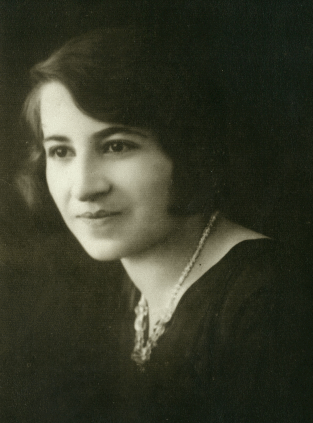| From
Generation to Generation
|
|
The Aunt by Elaine Rosenberg Miller |

All our lives, my sister and I had heard about my father’s
aunt, how she had stayed behind with her elderly parents as her siblings and
their families fled towards the Soviet Union at the end of the lull following the
first weeks of the war. A Yiddish speaking Russian soldier had knocked on the door
of their wooden house in Ulanow, Poland and said “We’re leaving in the morning.
If you know what’s good for you, you’ll come with us.” My teenaged father urged his parents to leave. “I didn’t
want to be anywhere the Nazis were going to be,” he later told me. “Your parents listened to you?” I asked. “I was working since I was twelve. I had a business,
employed two men to make reed baskets.” “But still.” “I had read Mein Kampf” he said, “and I believed every word.
I believed that if Hitler got the chance, he would kill every Jew.” So, they left. Six adults and thirteen children. But Ruchel did not go with them. She stayed behind. Ruchel, twenty-seven, unmarried, was the youngest of eight
brothers and sisters, a child of her parents’ later years. “I remember her standing there on the side of the road,
waving at us,” my father’s sister once told me. “She wanted to come with us so
badly. But she didn’t.” “Are you sure that your grandparents couldn’t have made the
trip?” I asked. “They would have died on the way or in Siberia.” “When your mother survived the war,” I said, “she was one of
the few people of her generation left alive. Everyone was gone.” She was silent. “What was she like?” I asked. “Who?” “Ruchel.” “Oh, she was very pretty.” “What color eyes?” “I don’t remember.” “Grandma had green eyes. Did she have green eyes?” “I was just a child.” “Did you ever find out what happened to your grandparents?” She shook her head. “How did they die?” “No one knows.” “No one?” “I heard that they died in the street. I heard.” “What?” “From starvation.” “And Ruchel?” “Maybe Belzec. Maybe.” For years, my sister and I heard about Ruchel. Her act silenced us. Whatever problems we faced, questions we had, the image of
Ruchel waving at her departing family made all pale in comparison. A photograph of Ruchel revealed a young woman who wore her
hair in a loose bob. Her expression was determined. It seemed to say, that
given the right set of circumstances she would have left Ulanow, moved to a
city, created a life for herself, perhaps gone dancing, been held by a man. “When was this taken?” I asked my father. “About 1937.” “She had a nice dress.” “She could sew.” “Very modern.” “She was good in business. She could speak Polish and
German.” “Do you remember her?’ He nodded. “My grandparents were wonderful people. Whenever I would
visit, my grandfather would say ‘Ita, give the boy something to eat!’” My father, hobbled by osteoarthritis, sat in the sun of his
Florida independent living facility and remembered his youth. I wondered at how arbitrary his survival had been. “After the war, did your mother ever talk about Ruchel and
her parents?” “No.” “Why not?” “What was there to say?” We sat silently. “The one thing that saved us,” he said slowly, “was that we
were always together.” I looked at my father. I recalled my sister’s phone calls
detailing his increasing medical problems. His face was ochre colored, his eyes
red rimmed. Purple splotches disfigured his hands. Still, he was remarkably
handsome. His eyes, unencumbered by recently removed cataracts seemed more
hazel than brown. “C’mon, Dad. It’s time to go in for dinner. Let me help
you.” Elaine Rosenberg Miller is an attorney living in West Palm Beach, FL. Her essays, memoirs, poems and short stories have appeared in Allgenerations; Best of Wilderness House Literary Review (Wilderness House Press); Jewish Magazine; Lit Up Magazine; Miranda Literary Magazine; Museum of Family History; Robin Falls Literary Magazine; The Binnacle (University of Maine at Machias Press); The Brooklyn Voice; The Cartier Street Review; The Forward; The Jewish Woman; The Writing Room Literary Anthology; Up The Staircase Literary Review; Wilderness House Literary Review; Women and The Holocaust; Women In Judaism: A Multidisciplinary Journal (University of Toronto) and Writing Raw. |